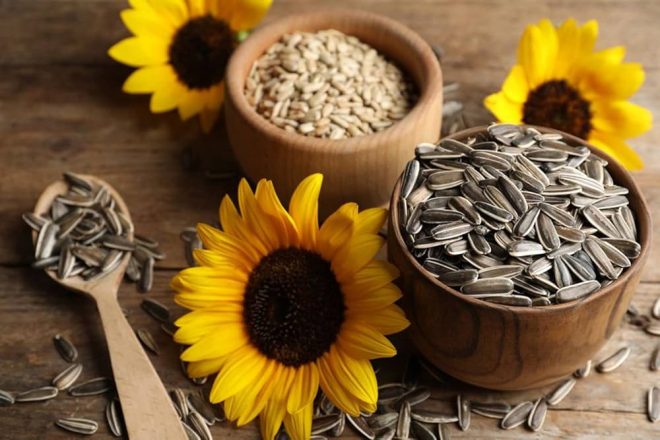
Sunflower Seeds Healthy Benefits
At a baseball, you might remember munching on sunflower seeds. However, you may feel comfortable about regularly consuming these small seeds, unlike some other stadium fare like cotton candy, foot-long hot dogs, and cheese-dripping nachos. The huge blossoms of sunflower plants yield sunflower seeds, which are sold roasted, raw, salted or unsalted, and shelled or in-the-shell. Despite their small size, sunflower seeds are packed with nutrients in their black-and-white striped shells. They taste just as good sprinkled over salad as they do when eaten raw for a convenient, delectable snack.
Sunflower seed nutrition
- Calories: 165
- Total fat: 14 g
- Saturated fat: 1.5 g
- Monounsaturated fat: 2.5 g
- Polyunsaturated fat: 9 g
- Sodium: 1 mg
- Carbohydrate: 7 g
- Fiber: 3 g
- Sugar: 1 g
- Protein: 5.5 g
- Calcium: 20 mg
- Iron: 1 mg
- Magnesium: 37 mg
- Zinc: 1.5 mg
- Selenium: 23 mcg
- Folate: 67 mcg
- Vitamin E: 7.5 mg

Health benefits of sunflower seeds
Not many studies have been conducted on sunflower seeds. However, they are abundant in protein, fibre, good fats, vitamins E, selenium, and other antioxidants. They can help you feel full and prevent chronic diseases because of this combination, which makes them a heart-healthy addition to your diet.
Healthy fats, fiber and protein:
Monounsaturated and polyunsaturated lipids are especially abundant in sunflower seeds. 2.5 grammes of monounsaturated fat and 9 grammes of polyunsaturated fat, which can help lower cholesterol, reduce inflammation, and enhance heart health, are found in one ounce, or around 1/4 cup, of sunflower seeds. Additionally, because sunflower seeds slow down digestion and include 3 grammes of fibre per serving, they can help you stay regular and lose weight. They include 5.5 grammes of protein as well. When fat, fibre, and protein are consumed together, they can prolong feelings of fullness.

Antioxidants:
Sunflower seeds provide 7.5 mg of vitamin E, which is precisely half of what adults should consume each day. According to the Harvard T.H. Chan School of Public Health, vitamin E is a potent antioxidant that either eliminates or completely prevents the generation of free radicals. Over time, free radicals can raise the risk of cancer and heart disease by damaging cells and causing inflammation in the body. For some people, taking vitamin E supplements can have more negative effects than positive ones, so it’s recommended to receive vitamin E from foods like sunflower seeds. Zinc, which is also found in sunflower seeds, aids in the growth and maintenance of immune cells.
Selenium:
A serving of sunflower seeds contains 23 mcg of selenium, which is about half of the adult dietary requirement of 55 mcg per day. In addition to being crucial for thyroid function, selenium has anti-inflammatory and antioxidant qualities that may lessen the risk of cardiovascular disease and cancer, according to early research.
How to eat sunflower seeds
Sunflower seeds can be purchased shelled or whole. If eating them with the shell, move the seeds to the back of your mouth and use your back molars (instead of your front teeth) to crack the shell. Enjoy the seeds after spitting out the shell. Choose the unshelled sunflower seeds if you’re trying to watch portion sizes while eating them as a snack. The stack of shells beside your plate may make it easier to keep track of how many seeds you’ve actually consumed.
It’s simple to purchase shelled sunflower seeds if you’re pressed for time or simply don’t want to shell them. These seeds can be eaten plain, swirled into yoghurt or oatmeal, or used to salads, homemade granola, or energy balls. Additionally, you can get sunflower butter or oil, which is an excellent substitute for other nut butters and frequently a decent option for those who are allergic to nuts.
